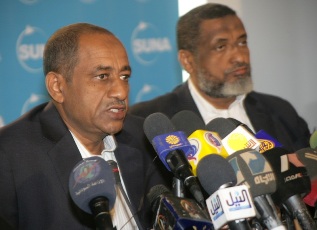Sudan blames Juba’s “negative attitude” for failure of oil talks
February 1, 2012 (KHARTOUM) – Sudan has attributed the failure of the latest round of talks with South Sudan on oil to Juba’s “negative attitude,” accusing its southern neighbors of plotting to topple the government in Khartoum.

The two countries have been negotiating for months to reach a deal on a fair charge to transport oil produced by the land-locked South Sudan through Sudan’s pipelines.
But as the talks dragged on and the gap remained wide, Khartoum moved to confiscate South Sudan’s oil, prompting the latter to accuse it of “stealing” oil revenues amounting to US$850 million. Juba later decided to suspend oil production all together and seek an alternative route to transport its oil.
Sudan’s statement said that members of its negotiating team had come to the negotiation table with every intention of reaching an agreement unlike their South Sudanese counterparts who sought to abort all possibilities of solutions.
The statement claimed that the South Sudanese government was “in fact seeking to create a crisis” through a flurry of “negative comments’ by the head of its negotiating team, Pagan Amum, as well as the decision to halt oil production while negotiations were in progress.
“The Government of South Sudan was not willing to reach a fair agreement,” the statement said, adding that this “negative attitude” had culminated in South Sudan’s decision to reject a deal proposed by the AUHIP to end the dispute within one month.
South Sudan’s president Salva Kiir Mayardit rejected to sign the AUHIP-proposed deal following head-to-head talks with his Sudanese counterpart Omer Al-Bashir on the margins of the AU summit in Addis Ababa earlier this week.
Kiir later said that the proposed agreement was “vague” on some issues and fell short of meeting South Sudan’s anticipation.
If signed, the deal would have seen South Sudan reversing its decision to halt oil production in response to Khartoum’s sequestration of its crude, and the latter receiving from Juba $4 billion over the next five years as well as 35,000 barrels per day for the use of refineries.
Kiir also suggested that the deal failed to address in holistic terms the fundamental causes of the crisis between the two countries which, according to Kiir, go beyond oil to include disputed border territories such as the hotly contested region of Abyei.
However, Sudan’s statement considered the inclusion of other issues such as Abyei as part of “the insurmountable preconditions” created by South Sudan to scuttle attempts to reach an agreement.
Furthermore, the statement said that the goal of this intransigence, “as GoSS mistakenly believe”, is to prepare the ground for changing the regime in Khartoum through the south’s northern proxy agents of the Sudan People’s Liberation Movement North (SPLMN) in collaboration with Zionist lobby groups in the United States and other Western circles that harbor hostility towards Sudan.
Sudan routinely accuses Juba of supporting the SPLMN rebels who are fighting the government in South Kordofan and Blue Nile, and who fought as part of the southern army in the war against Khartoum which ended with a 2005 peace deal that paved the way for South Sudan’s independence in July last year.
Juba denies supporting its former comrades in arms and counter accuses Khartoum of supporting southern rebel groups.
The Sudanese statement further warned that Khartoum would hold South Sudan responsible for any attempt to destroy oil production facilities belonging to the Sudanese government, particularly the Greater Nile Oil Pipeline which runs through South Kordofan.
“As known to everyone, the rebels in South Kordofan and Blue Nile are receiving full support from South Sudan which organizes training camps for them on its territories”
The statement cited President Al-Bashir’s decision to release four impounded vessels containing South Sudan’s oil as a gesture of good will and evidence of Sudan’s desire to reach an agreement.
The statement concluded that the Government of Sudan will continue to negotiate in good faith and urged GoSS to reconsider its hostile attitudes towards Sudan.
(ST)
